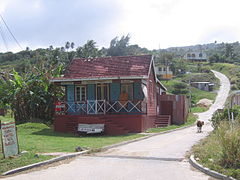Whether we are from another state or another country, it’s important to always take our kids back to their heritage, back to where their people come from. Traveling to explore one’s heritage is the most rewarding kind of travel a parent can offer themselves and their children.
A couple of weeks ago I had a conversation with my 7 year old son. I don’t recall what we were talking about but I told him that he was part West Indian. I was surprised by his response, an emphatic “No, I’m not! I don’t want to be Indian.” An easy misunderstanding I thought to myself, so I clarified and re-worded, telling him that I meant Caribbean, like his grandpa, great grandma and great grandpa. I might as well have been trying to clarify addition with multiplication. Surprisingly, he was still annoyed that I was labeling him something other than his birth name. So I broke down the family tree, naming everyone who was Caribbean, in full or in part. He heard me mention: “mommy, auntie, Uncle D, grandpa, cousin B, cousin M, great grandma, great grandpa.” Still no dice.
The conversation hurt my feelings and stirred up a hot pot of guilt. I knew at that moment that I had dropped the ball on teaching my son early in his life, his full identity and where his ancestors came from. Mommy’s fault – of course. Here was a teaching moment for both of us.
Too often we 1st generationers forget the importance of carrying the torch of our heritage and passing it on to our kids. Comfortable and assimilated in our environment, we occasionally tend to take our history for granted.
Little does my son realize that his heritage explains a lot about him – his likes and dislikes, his temperament, his beauty, etc. I told him, “That’s why you love coconut and fish so much.” These foods were just a couple of the staples in our family’s diet in Barbados. Cod fish cakes, bread fruit, coconut bread, patties – all foods that he has an affinity to that he can’t explain. All he knows is that he likes it.
But again, it is my responsibility to teach them. I have to expose them and travel with my boys to the places of their origin. This is intentional travel, heritage travel at its best.
When we get to Barbados, my son will be enchanted by the pristine blue water; soothed by the clean air; satiated by the delicious foods, and whine when it’s time to leave. He won’t know what hit him when the day comes where he accepts all of who he is and wears it like a badge. In the meantime, mommy has to show him the way, pick out the size, and help him put it on. This is the only way that he’ll know.
*photo courtesy of Postdlf, Wikimedia Commons.

We’re definitely not first generation, but we make it a point to make sure our kids know who they are and where their family comes from. I think it’s important for kids to know their heritage and to see how they fit into the bigger picture.
You will have a great trip–and it will help him to know who he is.
Yes Marie, I believe most children “get it” once they actually “see it”. Thanks for stopping by.
Yes, yes! It is definitely up to us, the parents, to pass along our traditions to our kids. Not only because it is a part of who we are, but also because later in life they will appreciate and embrace what makes them unique. You come from such a rich, cultural background that he will have no problem loving it!
And Ana, I think one way to do that is to make one of the family’s yearly (or bi-annual) vacations a trip “home”. If it’s automatic and expected, everything else will fall into place. I think that the problem for me is that since my mother is from here, I took on more of my American side than my Caribbean side, especially when I was younger and faced jokes from other kids. It wasn’t until I went to college and became more secure with who I was did I truly value my duality and appreciate that I was both. It takes wisdom to appreciate difference.